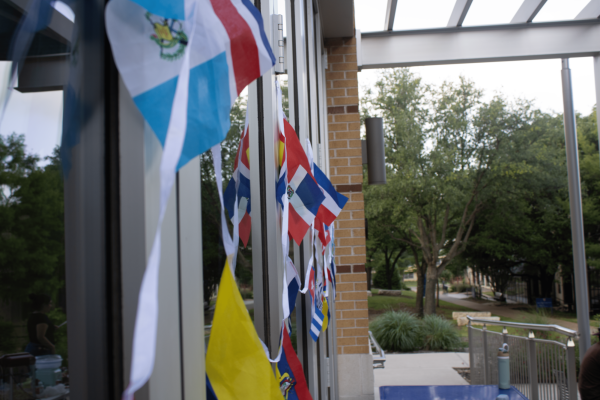The crisis in Afghanistan hits some students close to home

On August 15, 2021, the Taliban finished their takeover of Afghanistan by storming the country’s capital of Kabul after the United States announced the removal of U.S troops from the country.
For most Texas Wesleyan students, this crisis is one that elicits strong emotions, but it is still far removed and doesn’t affect their day-to-day lives. Freshman Haseebullah Safi, however, lives in constant worry that something will happen to his friends and family still in Kabul.
Safi arrived in Texas on August 17, two days after the Taliban takeover of Kabul. During what should be the happiest moment of his life as he celebrates his success, he lives in fear about what may happen to his mother and brother who are still in Kabul at the time this article was published.
Born in 2001 in Kabul, Afghanistan, Safi dreamed of studying in the United States for college because of the poor education he received during his junior and senior high school years. Schools have been shut down for two years in Afghanistan. First, because of the COVID-19 pandemic and then because of the funding issues that came from the pandemic as well as the Taliban slowly taking over the country.
“There was probably going to be no good way out of there. It turned out pretty bad you know; in terms of the way the withdrawal was made. [It] was probably going to happen one way or the other. If it had been done last year or the year before, it’s hard to see how it could have been handled in a way that was positive for the Afghan people,” said Dr. Carl Smeller, associate professor of English and liberal studies advisor.
Life changed overnight for the citizens of Afghanistan because of the group’s notorious reputation for vengeance, violence and vitriol. The Afghan citizens only have ten hours every day to complete their errands, or everything is locked down and they have to stay in their homes.
Women started buying burkas and covering their faces again out of fear and to avoid public beatings for showing their faces. Women are also not allowed to have a job or drive. Afghan women may go to school, but must go separate from men and wear a burka. Men are forced to pray in a mosque five times a day regardless of their job status.
As the American forces continued their removal of troops, things became more uncertain for those left in Afghanistan because there was no one to help the Afghan citizens when they were threatened by members of the Taliban.
There were thousands of American and Afghan people that were trapped inside the Kabul airport, outside the airport and scattered throughout the country.
Several controversies have erupted in the wake of the American troop withdrawal, not the least of which is how it was handled. Many agree that it could have been handled better and others think that there needs to be more information released about the decision to handle it the way it was handled.
“I think people need to actually look into the cause and the reason for why that stuff happened. I mean, it’s unfortunate, and I feel bad for the people that lost their loved ones,” said junior football player, Dalton Dale.
Once the troops were removed on August 31, then everyone else left behind–American or Afghan–had to avoid drawing attention to themselves for their own safety. Previously, the citizens of Afghanistan were told that the withdrawal would start in October so they were thoroughly unprepared when it was announced that it would happen in August and be completed by August 31. Safi and his family were preparing to move to go to Turkey but were unable to leave when the Taliban took over.
“People in the United States, enjoy your freedom. You are lucky. We are lucky. Right, now I [am lucky], but my family in Kabul, they [are not],” said Safi.
This article was updated on 09/14/2021 at 10:40am to show that Afghan women do attend school but are separate from the men and still wear burkas.









![Pippin, played by Hunter Heart, leads a musical number in the second act of the musical. [Photo courtesy Kris Ikejiri]](https://therambler.org/wp-content/uploads/2025/04/Pippin-Review-1200x800.jpg)
![Harriet and Warren, played by Trinity Chenault and Trent Cole, embrace in a hug [Photo courtesy Lauren Hunt]](https://therambler.org/wp-content/uploads/2025/02/lettersfromthelibrary_01-1200x800.jpg)
![Samantha Barragan celebrates following victory in a bout. [Photo courtesy Tu Pha]](https://therambler.org/wp-content/uploads/2025/05/20250504_164435000_iOS-834x1200.jpg)





![Hunter Heart (center), the play's lead, rehearses a scene alongside other student actors. [Photo courtesy Jacob Sanchez]](https://therambler.org/wp-content/uploads/2025/04/thumbnail_IMG_8412-1200x816.jpg)
![Student actors rehearse for Pippin, Theatre Wesleyan's upcoming musical. [Photo courtesy Jacob Rivera-Sanchez]](https://therambler.org/wp-content/uploads/2025/04/Pippin-Preview-1200x739.jpg)
![[Photo courtesy Brooklyn Rowe]](https://therambler.org/wp-content/uploads/2025/05/CMYK_Shaiza_4227-1080x1200.jpg)

![Lady Rams softball wraps up weekend against Nelson Lions with a victory [6 – 1]](https://therambler.org/wp-content/uploads/2025/04/Screenshot-2025-04-04-100924-1200x647.png)



















![[Photo courtesy Brooklyn Rowe]](https://therambler.org/wp-content/uploads/2025/05/CMYK_Shaiza_4227-540x600.jpg)
![Samantha Barragan celebrates following victory in a bout. [Photo courtesy Tu Pha]](https://therambler.org/wp-content/uploads/2025/05/20250504_164435000_iOS-417x600.jpg)
